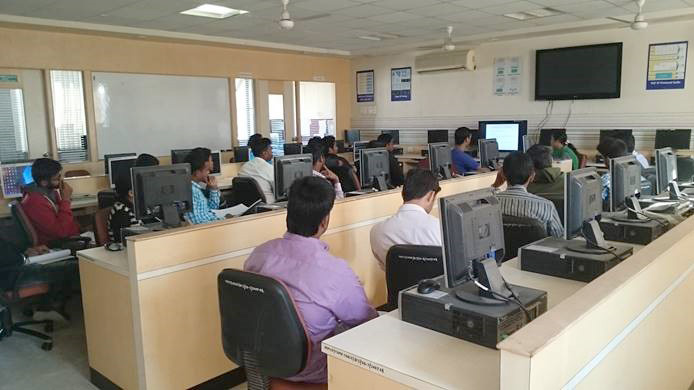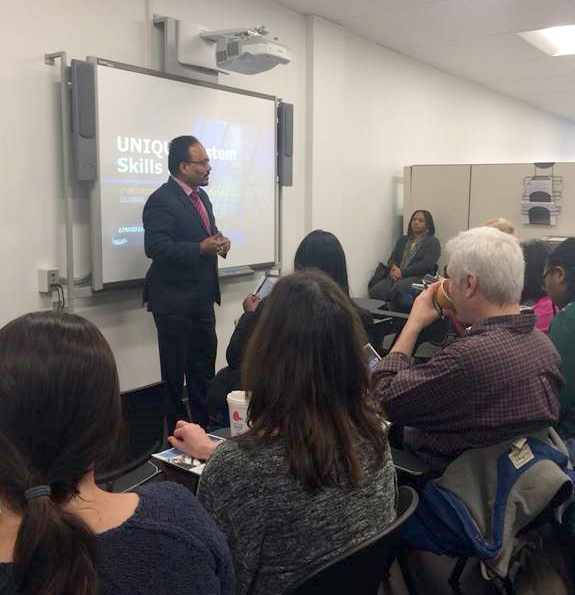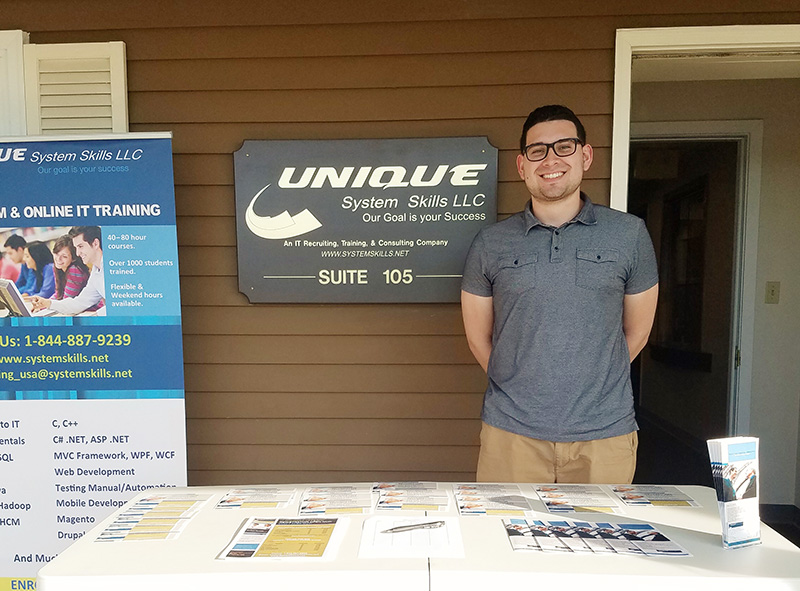Innovate.
A BIPOC-owned New Hampshire job placement business finds success serving veterans and the unemployed.
Unique System Skills LLC
ICIC Programs:
Goldman Sachs 10,000 Small Businesses (10KSB)
Inner City 100 (IC100)
Inner City Capital Connections (ICCC)
Santosh Salvi had what he thought was a stable career in middle management working for a major financial firm when he was unexpectedly laid off in July 2008. He had great skills within the company but soon learned he didn’t have the necessary tools for a new career. He had a wife and two children and they were living in New Hampshire.
He did some research and found a technology training program back home in India. He became certified in Information Technology and launched his own endeavor – Unique Systems Skills LLC (USS), an IT staffing and consulting company that focuses on training people for careers in technology.
“Once I got laid off I couldn’t find a job,” he remembers of the uncertain time. “I couldn’t find the right technical training. I didn’t have any other options.”
The Nashua, N.H. consulting firm began offering several courses and training programs. The programs ranged from two-to-five weeks and included courses in Excel, digital marketing, Microsoft Office, SalesForce, and more.
He brought the program to the New Hampshire Department of Education and won approval as a state contractor in 2016. USS began working with the unemployed, collaborating with counselors at career centers across New Hampshire and later Massachusetts, Pennsylvania, Maine and Vermont. They also began working with community colleges and smaller universities in need of more focused career services for their alumni.
“We look at the resume and see what is the gap and design a course for them to help them get the next job,” he explains. “We can also help them get industry certification.”

FINANCIAL SUCCESS
Participants in USS programs earn salaries between $60,000 and $120,000.
Serving those who serve
The company found another market with great growth potential: veterans. The military’s GI Bill and the Veterans Rapid Retraining Assistance Program both created opportunities for USS to provide job training for veterans.
“The GI Bill has been there since WWII so we try to market to them and get them into a civilian type skill, so the skills they learned in the military can be put to use,” says USS business development manager James Phelan. “We try to take someone with cyber skills in the Air Force or Army and train them into something in cyber security in the private sector.”
As businesses downsized and closed during the pandemic, many veterans were among those joining the ranks of the unemployed and USS provided resources to get them back into the workforce.
“We’re seeing quite a few veterans coming back for training,” Phelan said. “Most are coming back to sharpen up their IT skills. Many have been in cyber security in the military.”
The firm has helped place employees with a wide variety of tech companies, including Cisco, Hewlett Packard and IBM.
“There was no infrastructure at the career centers to work remotely,” Salvi says. “Many of the unemployed people were looking for training and training was getting delayed. That was a challenge.”
LOCAL SUCCESS = GLOBAL GROWTH
The company has corporate offices in Nashua, N.H. and Woburn, Mass. and works with several Fortune 500 companies worldwide, including 22 clients in the United States, 35 in India, and 2 in the United Arab Emirates.
Surviving the shutdown
Like all businesses, USS was forced to innovate when the COVID-19 shutdowns began in March. Career Centers where the unemployed would go for services provided by consultants and contractors like Unique Systems Skills, were suddenly shut down. Most were not set up for remote work and the career centers put job training aside completely to focus on helping people obtain Unemployment Insurance benefits.
“There was no infrastructure at the career centers to work remotely,” Salvi says. “Many of the unemployed people were looking for training and training was getting delayed. That was a challenge.”
USS quickly developed a remote system so its employees could work from home and began reaching out to career centers and clients to begin providing online services. Business was slow for months, but Salvi and his team used the down time to rebuild and improve their training programs, while adapting to the new reality of remote work.
“The biggest challenge is how to work from home,” Salvi said. “As the owner of the company, I always thought we needed to be together, understand each other, see the body language, talk friendly and work together. During this pandemic, Zoom and other tools have helped us get by.”
Once businesses began reopening, career centers followed. Business improved and there was a new market created for employees and employers looking for remote jobs.
“There were so many people out of jobs. Our responsibility is to make sure they are re-tooled and we want them to get the right jobs,” Salvi says. “We can train them the way employers want, we just need the requirements.”

ICIC’s impact
USS twice participated in Inner City Capital Connections and participated in Goldman Sachs 10,000 Small Businesses. Through the programs, Salvi and his team attended networking events and learned about innovative ways to grow the company and access government business assistance.
“I felt like they were really working at the roots. They’re working with the small businesses,” Salvi says of ICIC. “They’re working day in and day out on how to help small businesses. Accessing funding from the government is not easy. Getting that funding and trying to use it for the right reason and getting good results out of that, is not easy.”
The networking opportunities presented by the program were also vital as USS was able to leverage new relationships made through ICIC for new business.
“I worked with the corporations around Boston and asked them what kind of people they wanted,” he says. “We can find the people and train them.”
Salvi used the resources and put the strategies he learned from the Inner City Capital Connections and 10,000 Small Businesses programs into motion and the benefit to USS was evident. In 2016, 2017 and 2019, the company earned a spot on ICIC’s Inner City 100 list which recognizes and celebrates the top 100 fastest-growing firms in under-resourced communities.
In addition to benefitting from the educational programs, Salvi also liked the community aspect of ICIC.
“They are supporting small businesses and we are trying to build up the workforce,” he said. “That’s our aim – to make sure we build the workforce right here with working professionals who have experience and want to change their career.”
